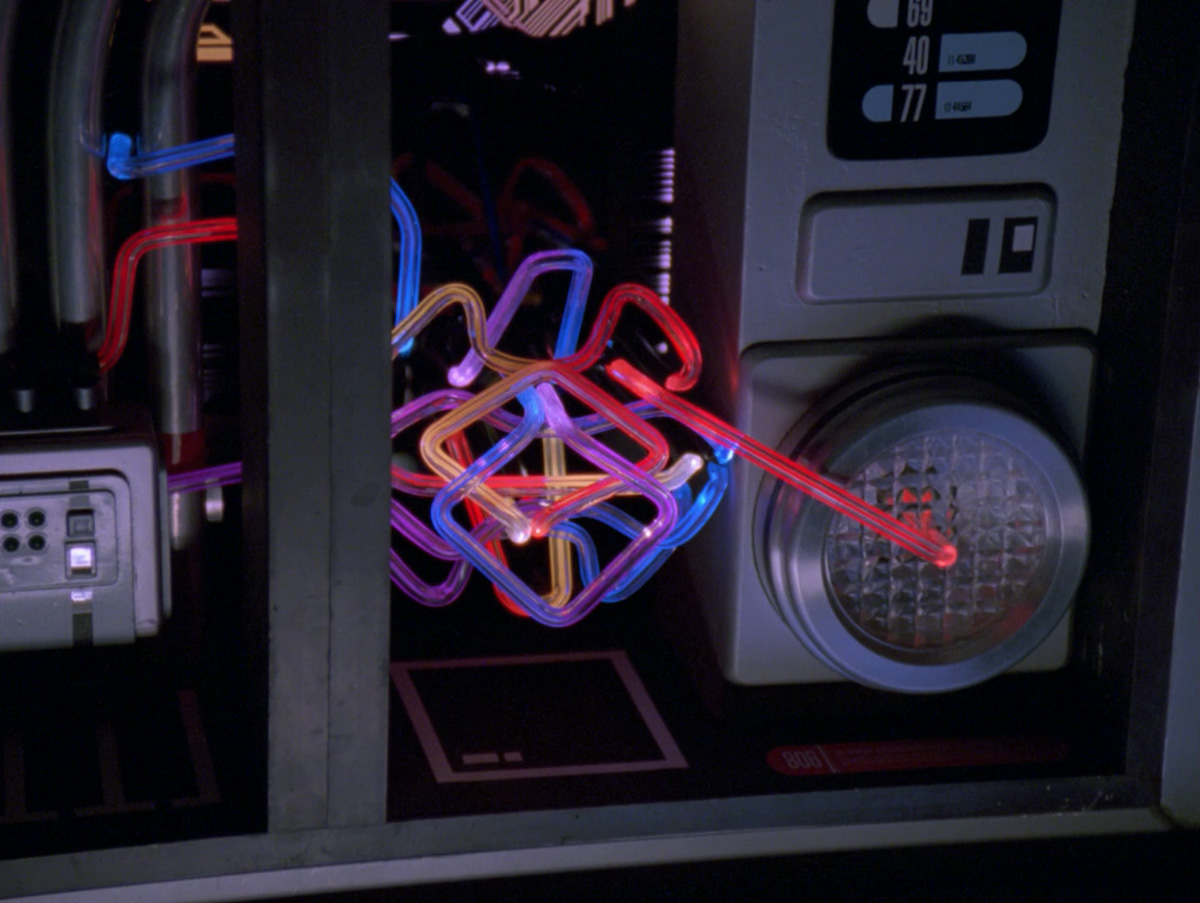“I’ll break my staff, bury it certain fathoms in the earth…!”
The seventh season of Star Trek: The Next Generation is awful. I’m on the record with that throughout: people grouse about Seasons One and Two, and there are certainly some magnificent misfires in those years; but in its early days, Next Gen was possessed of a spirit of adventure – and of creative possibility – that had entirely bled out of the show by its final few years. Seasons Five and Six are problematic enough; but Season Seven is a death march almost all the way through.
It’s a poor valedictory for a great show. Everyone is still doing their level best – the actors are heartily comfortable in their roles, and there’s a sense of fun about their performances – but they have long since moved past digging deep on their characters’ beats to find anything sharp or resonant. And the writers are continuing to fulfill the basic mission, finding new science fiction stories week by week (each of which bearing that shiny green Reset Button at the tail end, as per the series mandate); but the sense of discovery about any of those ideas has long since elapsed. On this point, I’ve got a fairly cynical theory: I think modern Star Trek did, legitimately, expend the sum total narrative potential of Star Trek as a science fiction format. It found every corner of this invented universe, and used it up. This is why Voyager and Enterprise tanked, and why Deep Space Nine only succeeded by bypassing Star Trek’s core structural format as an adventure-of-the-week science fiction series.
As, perhaps, a perfect case in point, “Emergence” presents a kind of ultimate far-out science fiction premise: the Enterprise, herself, gains consciousness and has a baby. In its way, it’s a lovely end-of-series nod to the beloved home for all the stories we’ve enjoyed on the series thus far; it’s gone past the point of cliché to say that the Enterprise is as much a character on the series as Worf or Picard, but that doesn’t make it any less true. “Emergence” takes that stance literally, and tries to explore the idea of the ship gaining self-awareness. It just does it incredibly badly.
The episode opens promisingly with Data performing his final Shakespeare reading on the holodeck, a scene from The Tempest, appropriately enough. The Orient Express – because every show has to do its Orient Express show eventually, as even Doctor Who proved last summer – crashes through Propsero’s island, and we’re off on a magnum opus of the series’ oft-used “the holodeck goes bananas” trope. Here, the holodeck goes bananas, because the holodeck is alive – and all of the series’ multitude holodeck scenarios start overlapping on the Orient Express.
The connection between the holodeck as the ship’s dream space and the emergence of artificial intelligence on the Enterprise is given one further, quite lovely, layer at the very end of the show, where Picard muses that if the holodeck also represents the dreams and fantasies of the crew itself, then hopefully, the values that a holodeck-generated intelligence would hold would naturally mirror the (hopefully, good) values of the good people of the good ship Enterprise herself. In moments like these, I can see a clear and rather lovely creative intent at play in “Emergence.”
As has long been the case at the tail end of the series, though, whatever goodness there is in the setup quickly gives way to the outright banality of the treatment. Star Trek has never been good at doing dream logic or holodeck worlds, and the resulting mashup in “Emergence” plays like “The Royale” meets “Phantasms.” The holodeck sequences are as uncreative and unconvincing a means by which to extrapolate the episode’s core idea as one could possibly imagine, a bunch of nonsense Freudian signifiers played out by hammy stock characters, played by go-nowhere day-player actors. (Only the train conductor manages to have any weight, thanks to an inappropriately creepy-old-uncle performance by David Huddleston.)
Meanwhile, out on the ship proper, Geordi chases around a bunch of “nodes” that the Enterprise is manifesting to help her develop her neural net, for which the esteemed production team elected to use jumbled-up Krazy Straws; and back on the holodeck, the Enterprise starts trying to kill various investigating team members by running them over with holographic taxi cabs and whatnot. (Data, being Data, stops a cab cold with just an arm, in the episode’s sole enjoyable gag.) It’s all just intractably silly and borderline unwatchable. It’s not quite the worst episode Star Trek: The Next Generation ever did, but it’s in the bottom ten… and probably the bottom five. With two episodes to go.

Blogging The Next Generation is winding down to the end, as I work my way through the episodes of Star Trek: The Next Generation on blu-ray. The final season is in stores now.
